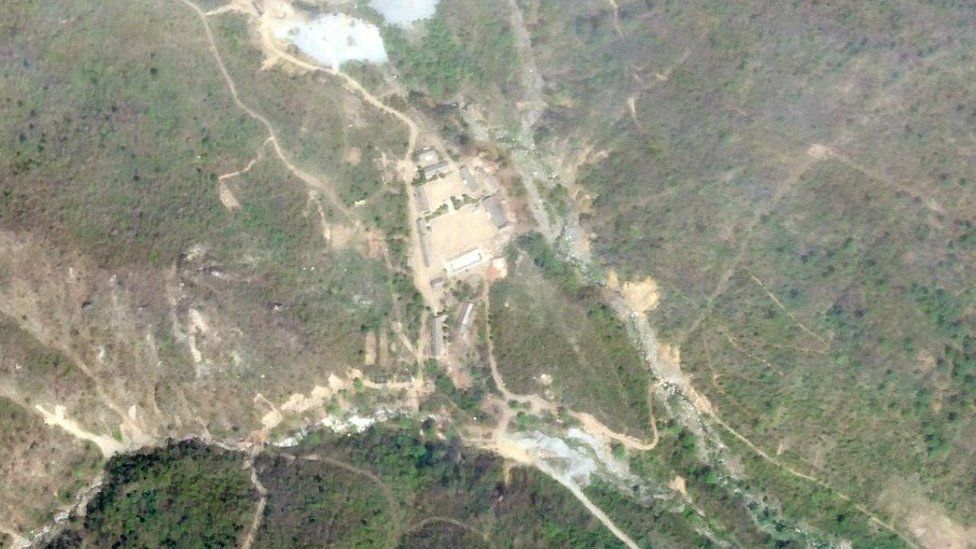Seoul offers radiation tests to North Korea defectors as group flags nuclear risks
South Korea will offer radiation testing to 881 North Korean defectors after concerns were raised about their exposure to the North's nuclear tests.
It comes after a research report warned that residents around Punggye-ri, the main nuclear testing site, could be exposed to radioactive leaks in water, BBC reports.
The Transitional Justice Working Group (TJWG) estimates that up to half a million residents are at risk.
It also potentially affects people in China, South Korea and Japan.
The group - which was established in Seoul in 2014 by activists and researchers from South Korea, North Korea, US, UK and Canada - analysed publicly available data and open-source intelligence for its latest report.
North Korea last tested a nuclear bomb in 2017 - the most powerful of six tests conducted at Punggye-ri.
It said the tests were conducted safely, but scientists have long raised fears that radioactive material might have escaped into the surrounding soil and groundwater.
North Korean defectors, who once lived near the site, have previously reported seeing strange illnesses in their communities, but scientists have not been able to establish a link.
Authorities in Seoul are now inviting all North Koreans, who escaped from nearby towns near the site, to be tested for signs of radiation.
Nuclear experts the BBC spoke to largely agree with the possibility of nuclear contamination laid out in TJWG's report but say its extent will be hard to determine.
Nuclear radiation can damage living cells partially or completely, sometimes resulting in cancer. As with most toxins, the risks associated with radioactive materials depend on the amount of exposure.
The Ministry of Unification, an executive department in South Korea promoting Korean reunification, stopped testing defectors for radiation exposure in 2019.
Nine of the 40 defectors tested in 2017 and 2018 showed "worrying levels" of genetic abnormalities, the group said in its report. While the TJWG did not directly attribute these to radiation exposure, it noted higher radiation doses for those who showed more abnormalities.
In particular, the TJWG flagged the leakage of radioactive materials into groundwater as a particular concern, given people's growing tendency to consume groundwater.
North Korea's 2008 census data shows that a sixth of households in the northernmost province of North Hamgyong, where Punggye-ri is located, use groundwater as drinking and agricultural water.
This proportion is likely to have gone up due to a chronic shortage of electricity across the country. Electricity is supplied only on a part-time basis even in the capital Pyongyang, which is always prioritised in resource allocation.
North Korea's weapons programme has accelerated under leader Kim Jong Un, who said in September 2022 that his country's nuclear weapons were no longer designed just to prevent war, but could also be used pre-emptively and offensively, to win a war.
"North Korea's rulers have sought to maximise international interest in its nuclear capabilities while avoiding attention on its human rights issues. There is in fact a tendency to view the North Korean nuclear issue solely from a security perspective," said the authors of the TJWG's report.

Unlike the US and Russia, which conducted nuclear tests in the early days, North Korea is fairly new to them, said freelance energy journalist Chris Cragg.
"The very odd thing is that North Korea keeps on upping its tests to keep on reminding the world that it has the technology, as a political gesture rather than a technical one. The rest of the world has largely abandoned testing because they know how such bombs actually work."
Mark Diesendorf, an energy policy researcher at the University of New South Wales, said the high radiation doses in the defectors reported by TJWG - about 100 times the global average of natural background radiation - is likely to increase the risk of cancers in those exposed. But he questioned how those doses were measured or estimated.
Underground tests are not very effective in containing radiation, he noted.
Scott Snyder, a senior fellow for Korea studies at the Council for Foreign Relations, said the history of nuclear testing around the world had drawn a "pretty consistent linkage between radiation exposure and public health impact on proximate populations".
It is "not surprising" that the health and environmental impact would be underappreciated or go unaddressed in North Korea, he added.
The TJWG said neighbouring countries like South Korea, China, and Japan might also be at risk because of the smuggling and distribution of agricultural and marine products, as well as North Korean specialities like pine mushrooms, from areas close to Punggye-ri.
The group called out the governments of these countries for not doing enough to guard their populations against these risks.
It noted that the South Korean government had come under criticism in 2018 for giving away pine mushrooms that its then-President Moon Jae-in received as a gift from Kim Jong Un to about 4,000 elderly families - reportedly without testing them for radiation.
Chinese authorities have also failed to stop the smuggling of North Korea's agricultural and marine products within China or to a third country, it alleged.
The group has urged South Korean and Chinese authorities to disclose results of past tests, for radiation exposure. It is also calling for an international inquiry into the radiation risks for communities around Punggye-ri.








